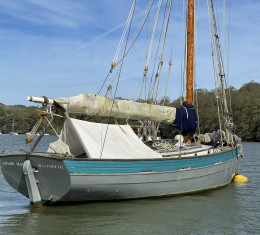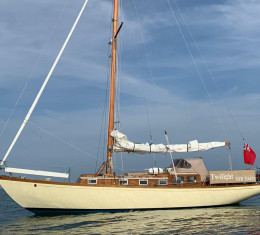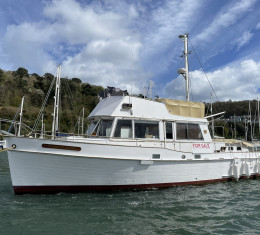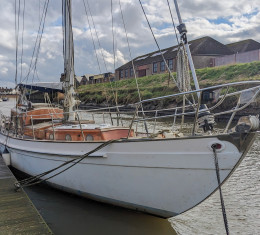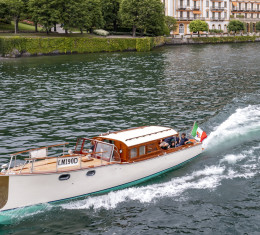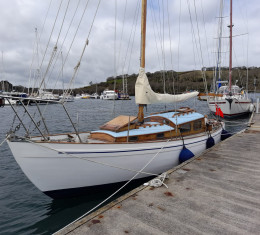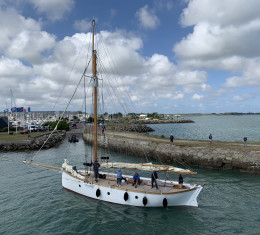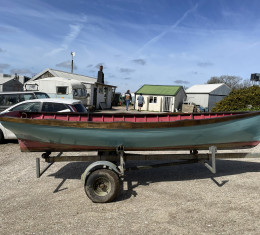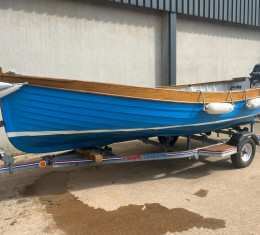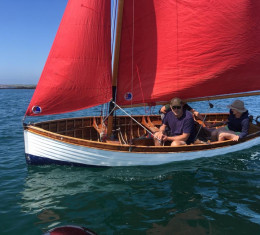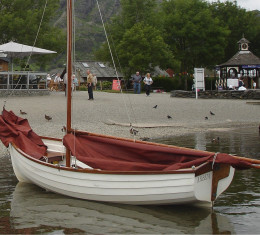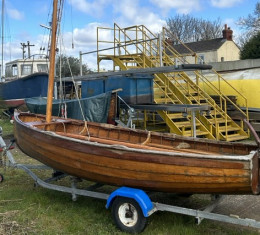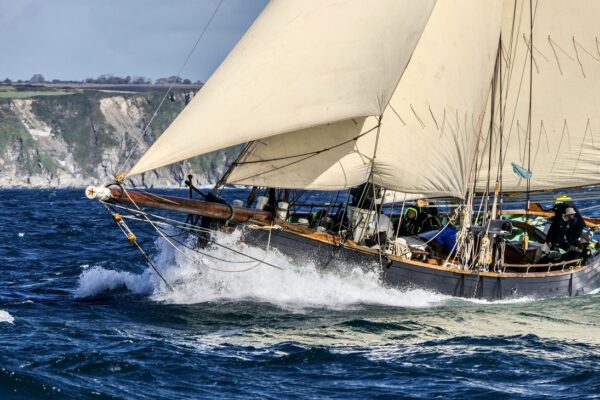Recycling end of life yachts
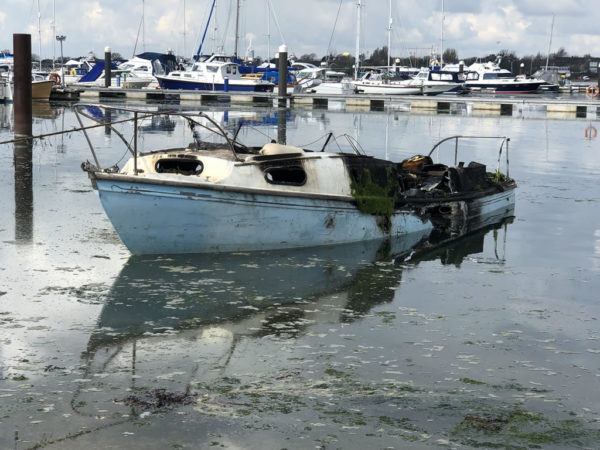
Recyling end of life yachts. Wood vs GRP
Nobody can say we at Wooden Ships are biased in favour of wood over grp for the construction of pleasure vessels. Every material has it’s ideal application, it’s advantages and disadvantages and wood and grp are no different. Contrary to expectations, often belief and to some extent promotional material, grp is not a no-maintenance material for the construction of yachts. The material does not last forever in its original form and it is this structural deterioration that becomes it’s major disadvantage in the construction of boats. Add to this advances in design, changes in fashion and loss of value and there becomes a major issue of what to do with grp boats as they approach end of life.
On the other hand, wood is a natural material and left to itself will gradually return to nature – which of course is it’s major disadvantage as the owners of so many wooden boats know to their cost. However the difference between wood and grp in this respect is that even major structural repairs in wood are very possible and with care we can prevent or at least delay the deterioration in wood – my own Vertue is over 80 years old and as sea-worthy for it’s designed purpose as first built with few significant repairs over the years. Major repair or prevention of deterioration in grp is difficult, certainly for the average amateur owner. In addition, repair to grp inevitably requires grinding and sanding reducing the material to dust which has its own envornmental and health implications. And given that most yards are shore side the risk of this debris finding its way into the sea is inevitable leading to the plastics pollution and its effect on marine life so frighteningly identified by Richard Attenburgh and others.
In broad terms boats – wood or grp – have the same basic constituents. Machinery and systems are largely the same; rig and deck equipment largely the same (the main difference of course being wooden or aluminium spars); interior outfit is not much different although the grp yacht will invariably contain more synthetic materials. This leaves the hull and deck – naturally recyclable wood or non-recyclable grp. So having reduced the grp yacht to its basic constituents what can be done with the hull which will be in any remotely way eco? And with no end of life recycling cost built into the modern grp yacht whatever is done to dispose of them risks being expensive for the owner.
Currently, the only legal constraint is what you can’t do, not what you can or must do. At the moment there appears to be 3 solutions. Firstly, take them to landfill. I for one have never seen a yacht in my local recycling centre and I am sure if I turned up with a boat in tow I would not be welcome. I don’t know anyone who has actually turned up at a land fill site towing a yacht behind the family car but I suspect you would be equally unwelcome.
Secondly, one hears of occasional accidents where a yacht has sunk and the sceptical will wonder about some of them. Sinking in deep water must be a tempting solution but fortunately the logistics of doing this are difficult enough to put this solution beyond the average owner’s ability.
And thirdly, we have all seen boats simply abandoned in boatyards and boat parks or even on moorings, a tempting and cost-effective solution. In the absence of obligatory registration owners can seldom be traced and even if a boatyard does know the owner, enforcing removal can be a costly business.
The good news is that help is on its way so it is perhaps appropriate that the French, as the major producers of grp yachts, should be the leaders in the field with an organisation called APER – L’Association pour la Plaisance Eco-Responsable – The Association for Eco-Responsible Marine Leisure. And most telling, this association was founded in 2019 by the yacht builders themselves – The Federation of Nautical Builders. There is surely a lesson here for us?
Of course being French there is a fair amount of bureaucracy involved but broadly, the system works like this:
The owner sets up a secure personal account and completes a form requesting destruction and recycling:
The owner selects a recycling/disposal centre.
The file is passed to the Maritime and Customs Office ( an office which has no direct equivalent in UK – a combination of Customs and Excise and The Registrar of British Ships) and APER validates the request.
The owner delivers the boat to the centre.
The centre dismantles the boat, disposes of the results, APER takes care of de-registration and issues a certificate confirming disposal.
There are of course costs involved. The yacht is delivered to the recycling centre at the owner’s cost. The operation of APER and the recycling is paid for partly by the Maritime Customs Office ( see above) and partly by the industry. There is no restriction on the industry passing on this cost to the first purchaser – which of course is almost inevitable so at the end of the day it is the yacht owner who bears the cost. Perhaps a justifiable cost of the hobby.
It is almost impossible to estimate with any certainty the number of grp boats of all types and sizes in UK waters but as an indication of quantities, in 2017 the hurricanes Irma and Harvey destroyed or seriously damaged around 63,000 boats throughout the Caribbean islands and it is in these French territories with limited landfill space that APER has first been introduced.
While this is all very commendable the question still remains of what to do with the recycled material. Fittings and equipment may well have a resale value and metals are readily recycled with current methods. However the French are a little vague about their recommendations and conclusions for recycling of the plastics although there are references to the cement industry and use of the debris for the manufacture of other products.
So what are the implications for the UK yachting business? Many will know that for over 20 years I have predicted this issue of end of life disposal of grp yachts so this French project is very welcome and demonstrates that there is at least awareness of the problem. It is now surely up to yacht owners to make the powers that be in UK – both government and industry- that we the consumers are aware and want something done. And at the end of the day, the consumer is a very powerful person.
Wooden Ships classic yachts brokers have an extensive database of boats for sale. With a wide range of sailboats, classic yachts, motor yachts and small classic boats, Wooden Ships has one of the largest selections of traditional wooden boats and yachts for sale in the UK. For more information about anything on our site please do ask us

